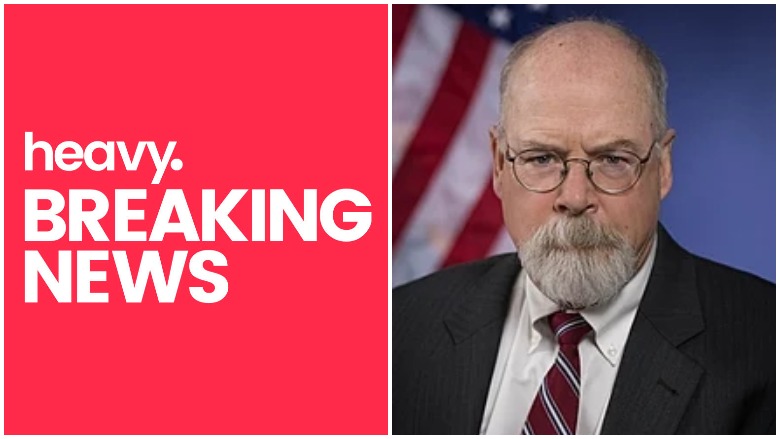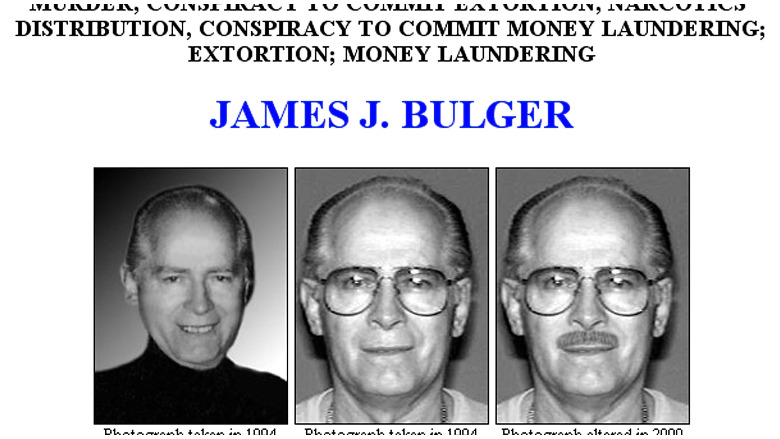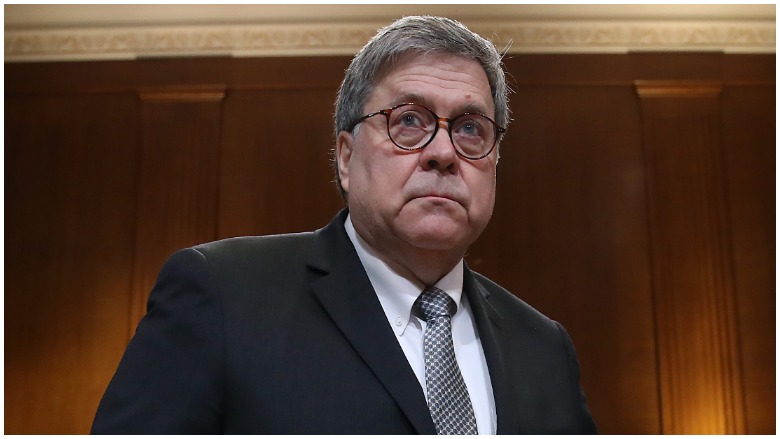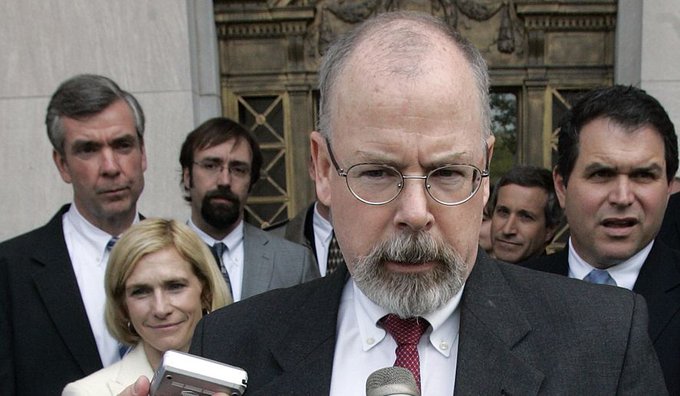
John H. Durham, Connecticut’s top federal prosecutor who was tapped by Attorney General William Barr to investigate the origins of the Russia probe, has worked on investigations for both sides of the political aisle. He’s primarily enjoyed a reputation as a “fierce” mob prosecutor in New England.
An investigation of the Russia probe’s beginnings – which has long been sought by President Donald Trump and was reported via sources in The New York Times – is certain to be fraught with political dispute. However, Durham has also led past probes on behalf of Democratic Attorneys General, namely Janet Reno and Eric Holder. His full name is John Henry Durham.
You can read Durham’s questionnaire when he was nominated as Connecticut’s U.S. Attorney here and below.
Here’s what you need to know about John H. Durham:
1. Durham, a Republican, Has Been Described as ‘Apolitical’ & ‘Cautious’
Trump nominated Durham to be the U.S. Attorney in Connecticut in 2017. However, he is not considered to be a very political prosecutor.
In 2009, The Washington Post described Durham as a prosecutor who has “parachuted into crisis situations for both political parties over three decades.” That year, The Post reported that Durham was a registered Republican but “generally is regarded as apolitical.”
According to The Hartford Courant, “beginning in the late 1990s, Durham, a Republican accepted controversial assignments for successive presidential administrations of both political parties.”
When Durham was named U.S. Attorney in Connecticut in 2017, he received bipartisan support, including from Connecticut Democratic U.S. Senators Richard Blumenthal and Christopher Murphy, who are critics of Donald Trump, according to The Courant. Time Magazine reported in 2009 that Durham has a reputation for being “thorough and cautious” but getting his prey when he “fixes on a target.”
The Democratic Senators recommended Durham to Trump for the Connecticut U.S. Attorney’s position, writing in a statement at the time, “We are confident that Durham will continue this record of success in providing strong leadership to the office….John Durham has earned immense respect as a no-nonsense, fierce, and fair prosecutor.” You can read the joint press release from Blumenthal and Murphy here. His nomination was unanimously confirmed by the U.S. Senate, according to C-Span’s Craig Caplan.
In 2011, The New Republic listed Durham among Washington’s “most powerful, least famous” people. “Durham had earned a nonpartisan, camera-shy, ‘white knight’ reputation in the Northeast before his move to D.C.,” the publication reported.
The Day reported that Durham was once described as having “an uncanny ability to identify the smallest of facts in a case” and “weave it together into a tapestry of detail,” but was sometimes known for mismatching his suit jackets and pants.
He was described as devoted to his family and Catholic faith and as having an “extreme work ethic.” According to The Day, Durham is married to wife Susan. Durham and his wife have four sons (two of them prosecutors) and eight grandchildren, the site reported.
When he was sworn in as Connecticut U.S. Attorney at age 67 in 2018, Durham said, “I am very honored to serve as Connecticut’s U.S. Attorney and deeply appreciative of all who have supported my nomination. I look forward to continuing to work with the dedicated and skilled people in our office and the brave men and women of our partner law enforcement agencies in the cause of justice for the people of our state and nation.”
2. Reno Appointed Durham to Look Into Alleged Law Enforcement Corruption in the Infamous James ‘Whitey’ Bulger Case

GettyWhitey Bulger
Durham looked into allegations of law enforcement corruption for a Democratic Attorney General, Janet Reno, in one of the most infamous crime cases in the past century: James “Whitey” Bulger. Johnny Depp played Bulger, an Irish-American organized crime figure and FBI informant, in the movie, Black Mass.
“I was appointed by Attorney General Janet Reno to head what became known as the Justice Task Force,” Durham explained on his Senate questionnaire. “The Task Force was charged with investigating the alleged corrupt relationship between law enforcement officers in Boston, Massachusetts with James ‘Whitey’ Bulger, Stephen ‘The Rifleman’ Flemmi and other members of the Irish mob knows as the Winter Hill Gang. The investigation resulted in the indictment and conviction of former FBI Supervisory Special Agent John Connolly on Racketeering and Obstruction of Justice charges and the indictment and conviction of former Massachusetts State Police Lt. Richard Schneiderhan on Obstruction of Justice charges. Connolly was sentenced to a period of 10 years imprisonment on September 16, 2002. Richard Schneiderhan was sentenced to a period of 18 months incarceration on July 8, 2003.”
Durham further noted: “I also have been involved in various special investigations for Attorney Generals of the United States. One such investigation (which is reflected in the prosecutions of John Connolly and Richard Schneiderhan…) related to allegations of corruption in the Boston Field Office of the FBI. A second special investigation was undertaken pursuant to the directives of Attorney Generals Mukasey and Holder relating to certain activities of CIA personnel.”
Furthermore, he added, “The prosecution and conviction at trial of former Massachusetts State Police Lt. Richard Schneiderhan related to Schneider’s leaking of confidential law enforcement information to Stephen Flemmi, Whitey Bulger and others.”
3. Holder Asked Durham to Look Into Alleged CIA Interrogation Abuse

(Getty)
In 2009, it was then-President Barack Obama’s Attorney General Eric Holder who turned to John H. Durham. At the time, Time Magazine called Durham a “low-profile professional thrust into a decidedly high-profile assignment.”
According to The Washington Post, Holder asked Durham “to investigate alleged CIA interrogation abuses, including episodes that resulted in prisoner deaths.” The president had expressed concern that Holder’s move could lead the AG to become “mired” in “past controversies,” The Post reported at the time.
According to The New Republic, “after reviewing dozens of allegations, he (Durham) recommended closing most of those cases—but he did advise continued inquiry into the deaths of two prisoners in U.S. custody.”
In 2009, Time wrote, Durham was also “named by Attorney General Michael Mukasey to head the ongoing investigation into the destruction of CIA interrogation videotapes.” The Times reported that Holder had basically expanded that investigation. Mukasey was named Attorney General by President George W. Bush.
4. John H. Durham Is a Career Federal Prosecutor Who Briefly Served as a Patrol Officer

GettyAttorney General William Barr.
According to his Senate questionnaire, Durham was born in Boston, Massachusetts in 1950. He graduated from the University of Connecticut School of Law in 1975, and from Colgate University in Hamilton, New York.
He has been employed with the United States Attorney’s Office since September 1989. In that office, he served in a variety of positions before becoming U.S. Attorney, including counsel to the U.S. Attorney, deputy U.S. Attorney, acting U.S. Attorney and Chief of the Criminal division.
He has been an adjunct faculty member at the University of New Haven. He was on the U.S. Department of Justice Boston Strike Force on Organized Crime as a trial attorney and served in the State’s Atorney’s Office career criminal unit in New Haven.
On the strike force, he wrote, “my principle focus was on the investigation, prosecution, and related appeals of organized crime cases. Those matters included mainly racketeering indictments involving labor racketeering, murder, extortion, and illegal gambling operations, involving members and associates of, among others, the Genovese, Gambino and Patriarca crime families.”
He has also worked as a deputy assistant state’s attorney.
In the 1970s, Durham worked as a lawyer on the Crow Indian reservation for what is now AmeriCorps. From June to September of 1972, he worked as a patrol officer for the Groton Long Point police department in Connecticut.
He does not have prolific writings, indicating, “I have not written or published any books, articles, reports or letters to the editor.” Similarly he wrote, “I have done my best to identify any speeches or talks, including a thorough review of my personal files and searches of publicly available electronic databases. I have located no responsive documents.”
He wrote that he had never been involved in a political campaign or held public office.
5. Durham Has Prosecuted Mobsters & Drug Traffickers
John H. Durham was asked to list his most significant cases in the Senate questionnaire. He chose some gritty examples in which he went after drug traffickers and mobsters.
“I served as lead counsel in the investigation and prosecution of more than twenty individuals who were members and associates of a racketeering enterprise known as the Los Solidos,” he wrote. “The indictment charged a total of 8 murders, including the murder of an 8-year old child, Marcelina Delgado, drug trafficking activities, weapons offenses, and associated criminal activities. Overall, 48 defendants were charged with crimes, and 42 pleaded guilty. Each of the individuals charged with murder was convicted at trial and sentenced to life imprisonment. Those not charged with murder, but with large scale narcotics activities, were convicted and sentenced to lengthy terms of imprisonment.”
One case involved the KKK. “In 1994, members and associates of the Ku Klux Klan in Connecticut engaged in activities constituting violations of the federal firearms statutes,” wrote Durham. “I was lead counsel in the ATF investigation that resulted in the indictment of several KKK members on federal firearms and explosives charges. I also served as lead counsel in the prosecution of KKK member William Dodge for offenses involving the illegal possession of firearms, silencers and explosives. Dodge was convicted after a full jury trial on the charged federal offenses and was sentenced to a period of 63 months incarceration.”
Some of his most significant cases, though, involved La Cosa Nostra.
“I served as lead counsel in the investigation and prosecution of members of the hierarchy of the New England Family of La Cosa Nostra (LCN),” Durham wrote. “In particular, in 1990 the U.S. Attorney’s Offices in Connecticut and Boston indicted the entire hierarchy of the New England LCN. Nicholas Bianco (the actual boss of the family at the time of trial), Matthew Guglielmetti (a capo in the family), and
numerous others were charged with and convicted of RICO activities in the District of Connecticut. Those racketeering activities included the gangland style murder of then-Underboss of the family, Billy Grasso, extortion, illegal gambling activities and associated offenses.”
He added: “The multi-month trial resulted in the conviction of all defendants and the lengthy incarceration of each person convicted. (Bianco was sentenced to 137 months incarceration; Petrillo was sentenced to 78 months incarceration; Frank Pugliano was sentenced to 151 months incarceration; Milano was sentenced to 396 months incarceration; Gugliemetti was sentenced to 57 months incarceration; Louis Pugliano was sentenced to life imprisonment; and Colantoni was sentenced to 151 months incarceration.)”
One case involved the Teamsters.
“I served as co-counsel in the investigation and prosecution of multiple officials and members of the International Brotherhood of Teamsters for offenses involving embezzlement of monies from the pension and health and welfare benefit funds,” he wrote. “Ultimately, Secretary Treasurer Vincent ‘Chickie’ Pisano elected to proceed to trial on the embezzlement charges. Following a lengthy jury trial, he was convicted on all counts and sentenced to a period of 18 months’ incarceration.”
In 2018, the Journal Inquirer reported that Durham wasn’t going to give a “pass on medical pot,” quoting him as saying, “Federal laws are properly enacted, modified, and repealed by Congress, not the Department of Justice. The U.S. attorney’s office in Connecticut will continue to prosecute violations of federal law consistent with priorities established by the Justice Department and our office.”
